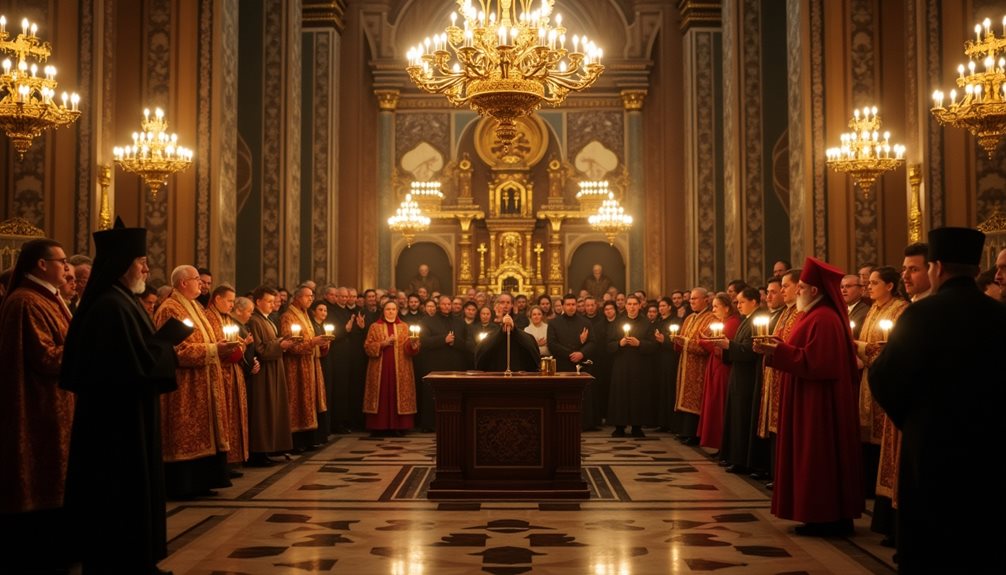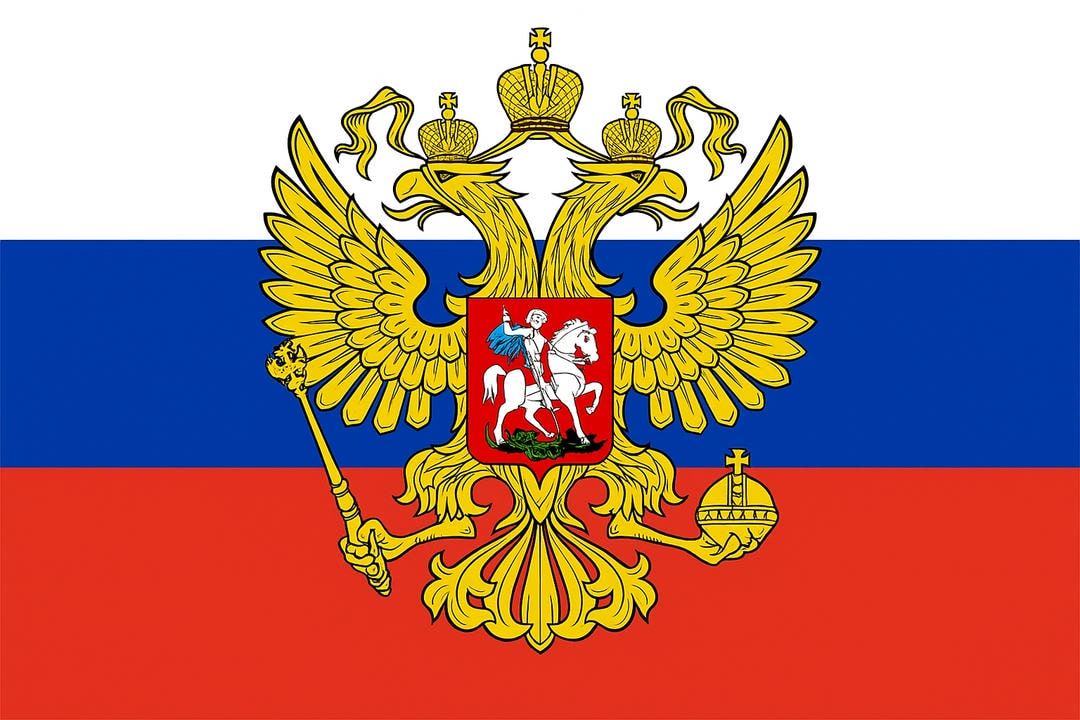Gifting flowers in Russia is not merely a gesture of kindness; it is a tradition imbued with deep cultural significance and a set of precise etiquettes. An odd number of flowers is essential for celebratory events, as even numbers are strictly associated with funerals. Each flower type and color conveys specific sentiments, with red roses symbolizing profound love and white blooms denoting purity. The manner in which these flowers are presented—fresh and elegantly wrapped—further underscores the respect and thoughtfulness behind the gift. Unraveling these customs reveals much about the Russian social norms and practices.
Russia’s Cultural Significance of Gifting Flowers
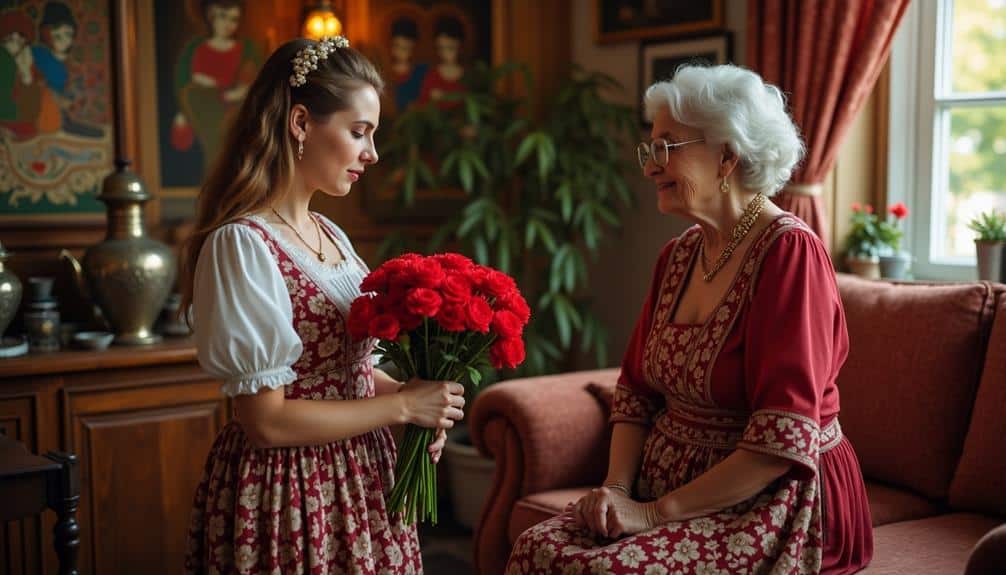
Historically, flowers are given to commemorate milestones such as birthdays, weddings, and anniversaries, as well as during solemn events like funerals and memorials.
The practice is not just a social norm but a reflection of the profound respect and emotional connection in interpersonal relationships.
Occasions for Giving Flowers
In Russia, the act of presenting flowers carries profound cultural significance, deeply rooted in historical traditions and societal norms. Floral gifts are a ubiquitous part of Russian life, marking various important occasions with elegance and meaning.
Wedding anniversaries, for example, often see the exchange of roses or lilies, symbolizing enduring love and commitment. Birthday celebrations are incomplete without vibrant bouquets, which convey personal well-wishes and joy for the recipient.
Housewarming gifts frequently include flowers, serving both as a gesture of goodwill and a means to bring natural beauty into a new home. Roses, chrysanthemums, and gerberas are popular choices, symbolizing warmth and prosperity.
Similarly, graduation ceremonies are another key occasion for gifting flowers, where bright and cheerful arrangements celebrate academic achievements and new beginnings.
Holiday traditions, such as International Women’s Day on March 8th, are also significant times for floral exchanges. On this day, men present flowers to women as expressions of respect and affection, making it one of the most flower-centric holidays in Russia.
Each of these occasions underscores the deep cultural reverence Russians hold for flowers, imbuing everyday acts with rich, symbolic meaning.
Odd vs. Even Number of Flowers
A deep-rooted cultural belief dictates that in Russia, the number of flowers in a bouquet carries significant meaning, rooted in superstition and tradition. According to the flower symbolism prevalent in Russian culture, an odd number of flowers is considered auspicious and appropriate for celebratory occasions. This tradition has a historical backdrop, as ancient Slavic customs associated odd numbers with positive energy and life.
Gift etiquette in Russia mandates that an odd number of flowers be given for birthdays, anniversaries, and other joyful events. Conversely, an even number of flowers is reserved for funerals and moments of mourning, as it is believed to bring bad luck and is linked to death. This cultural interpretation stems from the belief that even numbers represent completion, signifying the end of life’s journey.
The choice of seasonal flowers further enhances the cultural richness of floral arrangements. During spring, for instance, bouquets of tulips or lilies are favored, while autumn may see chrysanthemums.
Understanding these nuances in flower symbolism is essential for anyone wishing to respect Russian customs. The practice underscores the importance of thoughtful and informed gifting, ensuring that floral arrangements convey the intended message.
Meanings behind different types and colors
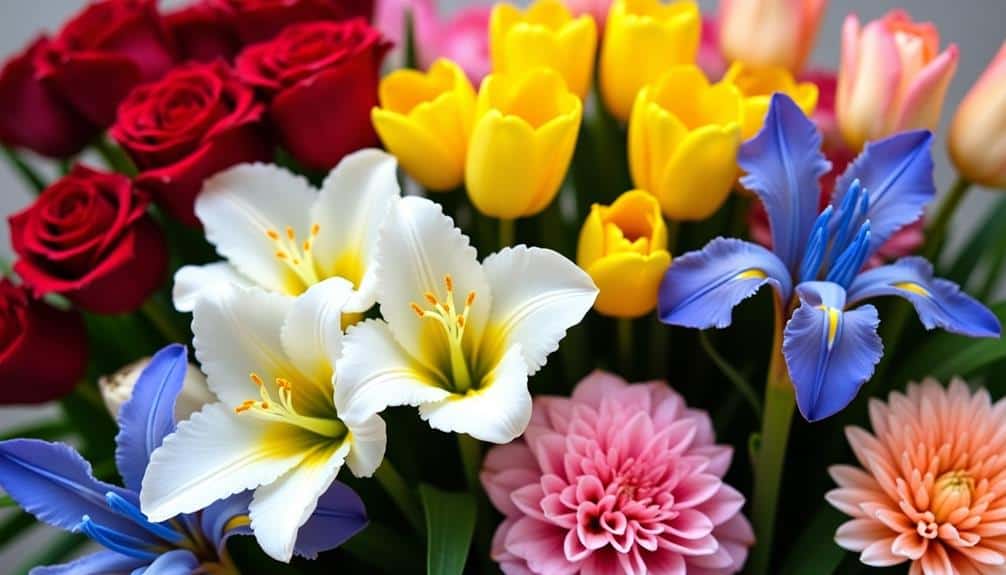
In Russia, various flower types and colors have profound meanings that extend beyond their aesthetic appeal, and are carefully selected to convey specific sentiments.
For instance, red roses signify deep love and respect, while white flowers are often associated with purity and solemnity. Yellow flowers, although sometimes seen as a symbol of infidelity or separation, can also represent wealth and success depending on the context.
Seasonal blooms are another important aspect of Russian floral etiquette. Spring flowers like tulips and lilies are commonly associated with renewal and new beginnings, making them popular during Easter celebrations. In contrast, autumnal blooms such as chrysanthemums are often used to signify remembrance and are traditionally placed on graves during the Day of Reconciliation.
Cultural variations also exist within different regions of Russia, influencing floral arrangements and their interpretations. Urban areas might favor more contemporary bouquets, while rural regions often adhere to traditional compositions.
Understanding these intricate details guarantees that the act of gifting flowers in Russia is both respectful and meaningful.
Occasions for Gifting Flowers
Historically, flowers are given on various occasions, such as birthdays, anniversaries, and public holidays, each event demanding specific attention to the number and type of flowers.
Understanding the importance of presentation and etiquette when gifting flowers in Russia requires a deep appreciation of the cultural nuances and historical traditions that surround this practice. The manner in which flowers are wrapped, for instance, plays a significant role. Russians place high value on aesthetically pleasing flower wrapping, which can transform a simple bouquet into a sophisticated gift.
Color coordination is equally essential; selecting hues that align with the recipient’s personal preferences and the nature of the occasion is vital.
Timing also holds substantial weight in the Russian context. Gift timing should be attuned to specific events, holidays, or personal milestones, ensuring the gesture resonates deeply. Furthermore, the seasonal availability of flowers is something to reflect on; gifting blooms that are in season underscores a thoughtfulness and alignment with nature’s cycles, adding a layer of cultural sensitivity.
Flower Shops and Accessibility
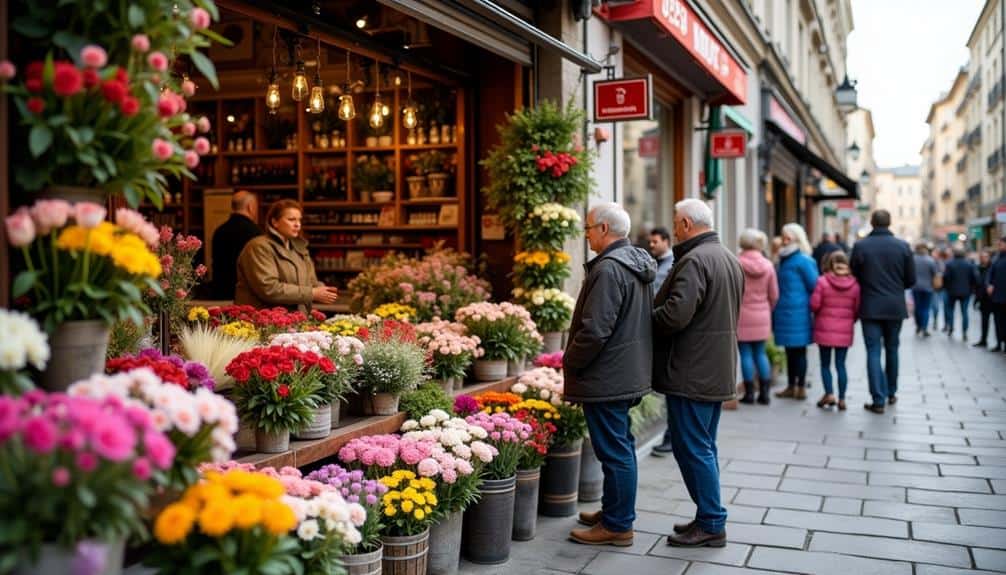
Charting the landscape of flower shops in Russia reveals a vibrant and deeply ingrained cultural practice that underscores the importance of accessibility. Historically, local florists have been integral to Russian society, catering to a populace that values the art of floral arrangements. These establishments often showcase an array of seasonal blooms, reflecting Russia’s diverse flora and changing seasons.
In contemporary times, the advent of online shopping has revolutionized the way Russians purchase flowers. Flower delivery services have become remarkably sophisticated, offering convenience and a wide selection of floral arrangements at the click of a button. This shift has democratized access, allowing individuals in remote areas to partake in this cherished tradition.
Local florists, however, remain relevant, providing personalized services and expertise that online platforms might lack. They offer insights into the cultural significance of specific flowers, guiding customers in making appropriate choices.
The interplay of tradition and modernity is evident in Russia’s floral market, where the convenience of online shopping coexists with the intimate, knowledgeable service of local florists.
Thus, the accessibility of flower shops in Russia is a reflection of a society that cherishes its cultural heritage while embracing technological advancements, ensuring that the timeless practice of gifting flowers endures.


